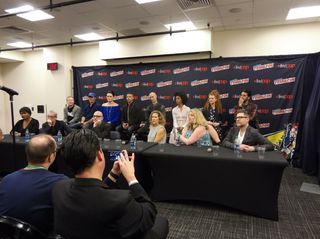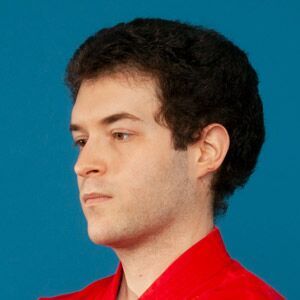'Star Trek: Discovery' Cast Tackles Criticism, Racism

NEW YORK – The cast and crew of "Star Trek: Discovery" are well aware that their show doesn't fit the traditional Trek mold. However, they're also eager to engage with fans and critics, and talk about how the show is different from — and surprisingly similar to — its predecessors.
After the huge Star Trek: Discovery Panel at Madison Square Garden during New York Comic Con 2017, I attended a smaller press briefing. There, a small group of journalists got to talk with the cast and crew directly, and take a deeper dive into the new hit show on CBS All Access.
Leading man and leading lady
The conference kicked off with a question from a reporter who really liked Gabriel Lorca ("That's your first mistake," joked Jason Isaacs, who plays the character) and wanted to know more about the aggressive captain.
"One of the joys of telling a story over 15 hours is that you don't have to do what traditionally network premieres do, where everyone tells each other their life stories as soon as they meet, even if they've known each other for decades," Isaacs said. "The richness and fullness of these people's lives will be revealed, including who Lorca is, and why Lorca is."
Sonequa Martin-Green (Cmdr. Michael Burnham) then had a chance to expound on how her Walking Dead role helped prepare her for Star Trek: Discovery.
"I was on [The Walking Dead] for five years. It was very much a postgraduate degree; that's the way I look at it," she said. "I learned an incredible amount about what it means to be an actor, a professional, a wife, a mother, a friend, an artist … To be on that goliath of a show that means so much to so many people, I feel that it was just the perfect experience to jump off into this.
"I came into Walking Dead when it was already established … But to be on the ground [in Discovery] and already know, to have intimate knowledge of an environment that is truly collaborative, familial, and where creativity is encouraged and nurtured — I knew what that environment felt like."
Get the Space.com Newsletter
Breaking space news, the latest updates on rocket launches, skywatching events and more!
One reporter asked whether the actors had a relationship with Star Trek before signing onto Discovery, and Anthony Rapp (Lt. Paul Stamets) revealed his status as a longtime fan.
"I did have a relationship growing up, watching [the original series] after school, and watching the original movies in the theater," he said. "In many ways, the closest DNA of our show to what's come before is a sort of blend of the original series and Deep Space Nine."
The Klingon question
Many critics (including myself) have expressed some concerns about the appearance and behavior of the Klingons in Discovery, citing their departure from established canon as well as the uncomfortable racial overtones in their appearance. Two reporters asked questions: one about how Mary Chieffo prepared for her role as the Klingon warrior L'Rell, and one about how the show represents Klingons as the "Other" while still humanizing them.
"I did watch all the Klingon-centric episodes, because there's a lovely, comprehensive list on the Star Trek Wikia page!" Chieffo said. "I did have an eye on the female Klingons and their representation … A character that really resonated with me was Grilka in Deep Space Nine. It's a real poignant storyline of a woman who cannot succeed her husband's house, because she's a woman.
"I do think what's fun about the Klingons is that they allow the women to be strong — they are innately strong women — but they still do live within this patriarchal species."
MORE: Star Trek Discovery Review - Strange New World
Alex Kurtzman, a producer, weighed in on showing the Klingon perspective:
"When you think about the Klingons, and you think about the idea of war, and why wars happen, and what divides us, the whole season arc is about asking the question of who we are, and what we give up our ourselves, and where we're going as a species. We ask it. The Klingons ask it. It's an exploration of that very fundamental question."
Where Star Trek has gone before
I asked the cast whether there were any particular characters in previous Trek series that inspired their performances in Discovery.
"I did go back and look at all the doctors," said Wilson Cruz, who plays Dr. Hugh Culber on the show. "What I loved about them was that they were the heart of the show. If [Spock] was the brain and Kirk was the brawn, McCoy was the heart, and I really wanted to infuse him with as much of that sensibility as possible."
"I would say no, the opposite," Isaacs said. "It's not that I didn't watch and love the original series, but that I had no desire to be a pale shadow of any of the brilliant stuff I'd seen before me."
"Definitely the Vulcans," Martin-Green said. "Leonard [Nimoy] for sure." She also gestured around her, indicating her castmates. “I really am inspired, informed by these actors, and by the other actors on the show."

Akiva Goldman, a producer, responded to concerns that Discovery seemed to sidestep or contradict existing facts within the Star Trek mythos.
"We are wildly aware of everything that appears to be a deviation from canon," he said. "We will close out each of those issues before we arrive at [the end of the show]."
Likewise, other members of the cast and crew weighed in on how the show takes place ten years before the original series, but looks more advanced as a result of modern filmmaking techniques.
"There is a traditional in Star Trek of attempting to use modern storytelling: visual techniques, props, visual effects, et cetera, to contemporize the original feeling that was generated by the props, and the sets, and the visual effects at the time," Goldman said. "We're trying to remain true to the technology that was available then, but represent it with the technology we have now."
"[Discovery] isn't just made for the Trekkies," Isaacs added. "It's for all the new people who have never seen it before. They want to see new stories with new tech. The fact that you don't see it ten years later on a different show is consistent."
Diversity and inclusion
The penultimate question was about the female relationships on the show, and how the cast and crew worked to develop realistic friendships.
"It's great to see [Capt. Philippa] Georgiou and Burnham's relationship, now happening again here between cadet [Sylvia Tilly] and former first officer," said Gretchen Berg, a producer. "You're paying it forward, and taking the lessons you've learned. And [Tilly] has a couple of things of her own she's teaching back."
"Sonequa isn't the captain of the ship, but she's the captain of this great big show," said Mary Wiseman, who plays Tilly. "She's a mother and a sister and a friend to all of us. I feel that way about the women behind the scenes, also."
To close out the conference, a reporter asked how the Star Trek fandom interacts with the cast, compared to other fandoms they've encountered, such as The Walking Dead or Harry Potter.
"I've seen a tremendous amount of happiness that Star Trek is back, and people that get ornery about certain aspects," said Rapp. "I ask people to give it a chance, and most of them will."
"I've been acting for 30 years, and I've never seen this kind of fan activity before something even came out," said Doug Jones, who plays Lt. Saru on the show. "What I can appreciate is that the fan base loves having ownership of [Star Trek] … we have a product that they want to know more about than anyone else."
"In Harry Potter, everyone loved the books, loved the films; there wasn't a dissenting voice," Isaacs said. "I've experienced through the social media stuff, mostly just love and excitement and fabulously positive things. But there are genuine fans who are skeptical, or don't want to pay, or who are obsessed with technical things. Believe me, they're tearing each others' eyes out in the writer's room about canon as well. We're thrilled that [fans] are arguing about it.
"There are also people who are upset that there is a woman lead, or a woman of color lead, or that there's a diverse platform for every gender and sexuality. Those people can go f**k themselves."
Even so, Isaacs wishes that he could convince racist, sexist and homophobic trolls to watch the show.
"I wish they would love each other, and us, and the rest of the planet. Those people whose timelines are filled with race hatred — I wish they would watch the show, because it's more aimed at them than anyone else."
"We all become a family around the campfire, sharing this story, those of us telling it and those of us seeing it," Martin-Green said. "That I have loved, feeling the transition from where I come from, to this family of Star Trek. That's why we're here."
Marshall is indebted to Sarah Lewin for additional reporting during the conference.
Originally published on Tom's Guide.
Join our Space Forums to keep talking space on the latest missions, night sky and more! And if you have a news tip, correction or comment, let us know at: community@space.com.

Marshall Honorof is a senior editor for Tom's Guide, overseeing the site's coverage of gaming hardware and software. He comes from a science writing background, having studied paleomammalogy, biological anthropology, and the history of science and technology. After hours, you can find him practicing taekwondo or doing deep dives on classic sci-fi.
